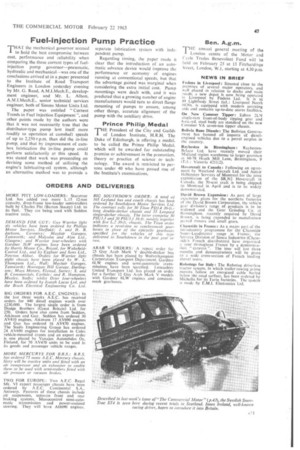Fuel-injection Pump Practice
Page 49

If you've noticed an error in this article please click here to report it so we can fix it.
THAT the mechanical governor seemed to hold the best compromise between cost, performance and reliability when comparing the three current types of fuelinjection pump governor—pneumatic, hydraulic and mechanical--was one of the conclusions arrived at in a paper presented to the Institute of Road Transport Engineers in London yesterday evening by Mr. G. Read, A.M.I.Mech.E., development engineer, and Mr. L. Albon, A.M.I.Mech.E., senior techniCal services engineer, both of Simms Motor Units Ltd.
The paper was entitled "Current Trends in Fuel Injection Equipment ", and other points made by the authors were that it was not necessarily true that the distributor-type pump lent itself more readily to operation at camshaft speeds of up to 2,250 r.p.m. than did the in-line pump, and that by improvement of cambox lubrication the in-line pump could perform satisfactorily at this speed. It was stated that work was proceeding on devising some method of utilizing the engine's lubricating-oil system, although an alternative method was to provide a
separate lubrication system with independent pump.
Regarding timing, the paper made it clear that the introduction of an automatic advance device would improve the performance or economy of engines running at conventional speeds, but that the advantage gained was marginal when considering the extra initial cost. Pump mountings were dealt with, and it was predicted that a growing number of engine manufacturers would turn to direct flange mounting of pumps to ensure, among other things, accurate alignment of the pump with the auxiliary drive.
Prince Philip Medal THE President of the City and Guilds of London Institute, H.R.H. The Duke of Edinburgh, is offering a medal. to be called the Prince Philip Medal, which will be awarded for outstanding promise or achievement in the promotion. theory or practice of science or technology. The award is restricted to persons under 90 who have passed one of the Institute's examinations.












































































































